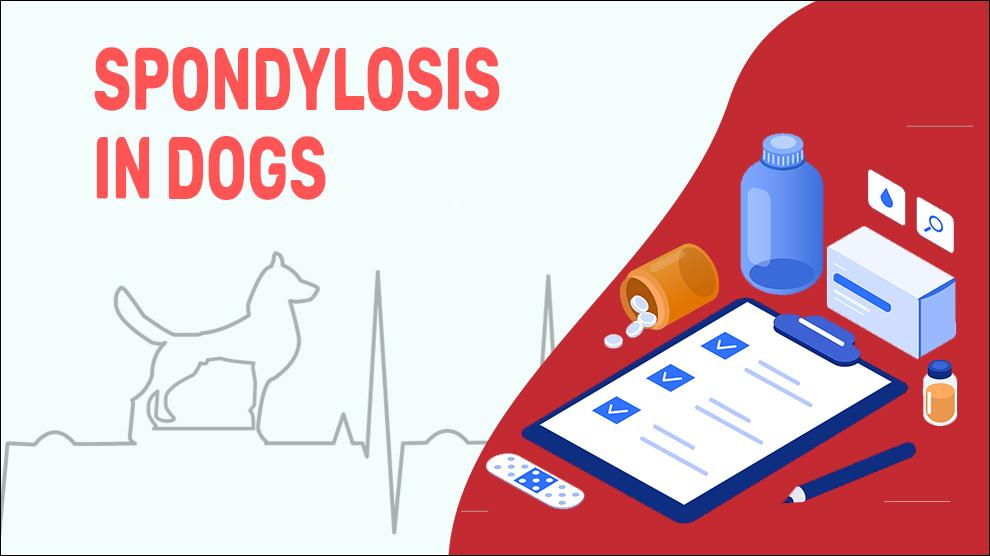What Is Spondylosis In Dogs?
Spondylosis is defined as a non-inflammatory, degenerative disease of the vertebral bodies of the spinal column where osteophytes (bone spurs) develop along the outer edges of the spinal bones. Also known as spondylosis deformans, this is considered to be arthritis of the spine but unlike arthritis, this is a non-inflammatory condition.
Most commonly, this degenerative joint disease is associated with old dogs and can also develop as a secondary issue if the dog has had spinal surgery or intervertebral disc disease. Spondylosis can be distinguished from discospondylitis, where discospondylitis is a bacterial or fungal infection of the vertebral endplates and intervertebral disks. In the case of spondylosis, the endplates are non-ragged and smooth. Though, it is possible to have both discospondylitis and spondylosis at the same level. This is most commonly seen in middle-aged and older dogs.
The range of lesions varies from small osteophytes on the ventral or lateral ends of the articular regions of vertebral bodies to big, callus-like proliferations/ boney bridges of bone between neighboring vertebral bodies and vertebral end plates degeneration (sclerosis). Though lesions can crop up anywhere down the vertebral column, those in the lumbosacral junction and lumbar spine are most common. Wallerian degeneration in the spinal cord and Axonal damage are associated with disc compression and herniation but can be due to bone spurs formation, in spinal nerves, compressive lesions may occur due to bone expansion.
Primary factors important in its development include degeneration of the articular facets of the vertebral bodies, disc herniation, intervertebral space collapse, and intervertebral disc degeneration.
Symptoms Of Spondylosis In Dogs
- Altered gait
- Ataxia (loss of co-ordination)
- Back/ neck pain
- Reduced range of motion
- Stiffness
- Numbness and weakness in the limbs
- Lameness
- Resistant to touch along the back
Treatment Options For Spondylosis In Dogs
NSAIDs like
- Carprofen (Aventicarp, Carprieve, Rimadyl, Canidryl, Zinecarp, Rimifin, Carpox, Vetprofen)
- Meloxicam (Muvera, Metacam,Mobic)
- Firocoxib (Equioxx, Previcox)
- Deracoxib (Deramaxx, Novartis)
- Etodolac (Lodine, EtoGesic)
Hemilaminectomy: Spine surgery is done to broaden the spinal cord by removal of part of the laminae on the vertebra to ease excess pressure on the spinal nerve.
Foraminotomy: When there is a narrowing of the nerve opening (foraminal stenosis), this decompression surgery is performed to enlarge the opening where a spinal nerve root leaves the spinal canal.
Home Remedies For Spondylosis In Dogs
- Home remedies such as medications, exercise options, and diet will be based on your dog’s age and severity of the disease.
- Weight management is a significant concern for SSS. Several studies have shown the association between the increased risk of heart diseases and being obese.
- Work with your vet to find the optimal dietary plan for your dog.
How To Prevent Spondylosis In Dogs?
Diet: Healthy, wholesome, nutrient-packed diet for the dog’s age and lifestyle
Weight: Maintenance of ideal weight based on calculated RER calories
Exercise: Promote the right amount of exercise for healthy weight loss
Supplements: Bone, spine, and joint supplements
Affected Dog Breeds Of Spondylosis
Airedale Terrier, Bassett Hound, Bulldog, Beagle, Corgi, Dachshund, Doberman Pinscher, German Shepherd, King Charles Spaniel, Labrador Retriever, French Bulldog, Pug, Pekingese, Shih Tzu, Large Dog Breeds, Small Dog Breeds, Boxer, Middle Age Dogs, Senior Dogs
Causes And Diagnosis For Spondylosis In Dogs
1. Causes:
- Chondrodystrophic Dogs: Beagles, Bichon Frise, Dachshunds, Lhasa Apso, etc are the most prone
- Slipped disc
- Spondylitits
- Spinal trauma
- Spinal Arthritis
- Degenerative Myelopathy
- Pulled muscle, strains, sprains
2. Morbidity:
- Cause: Inheritance
- Gender: There is no sex predisposition
- Onset: Geriatric onset
- Hereditable: Yes
3. Mortality:
Sometimes, in dogs that are badly affected by spondylosis, it can lead to disc degeneration. The rupture of disks may occur bit by bit, but in some dogs, the process of rupturing may happen suddenly after a latent period of degeneration. In a moment, dogs may go from normal walking to total paralysis.
4. Diagnosis:
- Complete blood work, Serum chemistry, Urinanalysis
- Orthopedic exam to check for joint pain or problems
- Radiographs to look at the bones and joints
- Myelogram (imaging procedure using a contrast dye to highlight compression)
- Magnetic resonance imaging (MRI)
- Neurologic exam
- Spinal tap
5. Prognosis:
Since there is no proper cure for spondylosis, Veterinarians usually give suggestions for control or management of the problem.
When To See A Vet For Spondylosis In Dogs?
- Altered gait
- Ataxia (loss of co-ordination)
- Back/ neck pain
- Reduced range of motion
Food Suggestions For Spondylosis In Dogs
- Lean, home-cooked, or boiled meats (chicken, beef, turkey, fish)
- Green Leafy Veggies: Kale, cabbage, spinach, and swiss chard
- Whole Grains: Oats, Brown rice, barley, quinoa, and buckwheat
- Fresh vegetables/fruit (carrots, green beans, banana, orange, apple, Blackberries, Raspberries, Blueberries, etc)
- Oily Fish such as Salmon, anchovies, tuna, Sardines, Cod, Herring, Lake trout, and Mackerel (omega-3 fatty acids)
- Nuts such as Brazil nuts, almonds, walnuts, and Hazelnuts (calcium, phosphorus, magnesium, vitamin E)
- Dairy products: Milk, cheese, yogurt, etc (calcium, vitamin D)
Conclusion
For a condition like Spondylosis, never skip your dog’s wellness examination. Spondylosis in dogs is a progressive disease that can restrict a dog’s mobility. Most of the treatments are supportive and are intended at treating the pain as well as delaying the progression of Spondylosis.

















